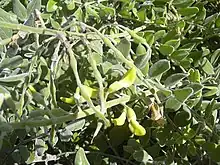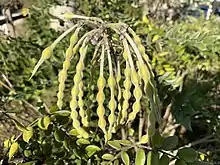Sophora tomentosa
Sophora tomentosa, also known as necklacepod, yellow necklacepod,[3] and occasionally as silver bush, is a pantropical[1] shrub or small tree in the family Fabaceae. It commonly ranges in height from 4 to 10 feet and often occurs in coastal conditions and near wetlands.[4] The common name Necklacepod is derived from the characteristic string of seed pods that develop after its yellow flowers germinate into seeds.
| Sophora tomentosa | |
|---|---|
 | |
| Scientific classification | |
| Kingdom: | Plantae |
| Clade: | Tracheophytes |
| Clade: | Angiosperms |
| Clade: | Eudicots |
| Clade: | Rosids |
| Order: | Fabales |
| Family: | Fabaceae |
| Subfamily: | Faboideae |
| Genus: | Sophora |
| Species: | S. tomentosa |
| Binomial name | |
| Sophora tomentosa | |
| Synonyms | |
| |
Necklacepod is a nectar plant for bees, butterflies, and in parts of the Americas hummingbirds as well. It is suggested for use by native plant enthusiasts in Florida as a good landscape plant for xeriscaping[5] but it only naturally occurs in coastal counties in the central and southern part of the state,[4] while closely related varieties occur in Texas, and the Caribbean.[6] The variety of Necklacepod growing in Australia is considered an endangered species in some areas due to the clearing of coastal habitat and displacement by invasive species.[7]
In Sri Lanka, the plant is known as moodu murunga. The inedible pod has some similarities to the murunga (drumstick) pod. It has been used to make fish poisons, insect and spider repellents etc., esp in Africa.

References
- "Sophora tomentosa". Germplasm Resources Information Network. Agricultural Research Service, United States Department of Agriculture. Retrieved 2011-06-09.
- "Sophora tomentosa L. — the Plant List".
- USDA, NRCS (n.d.). "Sophora tomentosa". The PLANTS Database (plants.usda.gov). Greensboro, North Carolina: National Plant Data Team. Retrieved 21 November 2015.
- Wunderlin, Richard; Bruce Hansen. "Atlas of Florida Vascular Plants". Institute for Systematic Botany, University of South Florida, Tampa. Retrieved 24 March 2011.
- Gann, G.D. "Natives For Your Neighborhood". The Institute for Regional Conservation, Miami. Retrieved 24 March 2011.
- "plants.usda.gov". US Department of Agriculture. Retrieved 24 March 2011.
- "Sophora tomentosa (a shrub) - endangered species listing". New South Wales Department of Environment, Climate Change and Water. Archived from the original on 30 July 2008. Retrieved 24 March 2011.
External links
 Media related to Sophora tomentosa at Wikimedia Commons
Media related to Sophora tomentosa at Wikimedia Commons Data related to Sophora tomentosa at Wikispecies
Data related to Sophora tomentosa at Wikispecies- Sophora tomentosa pictures from hear.org